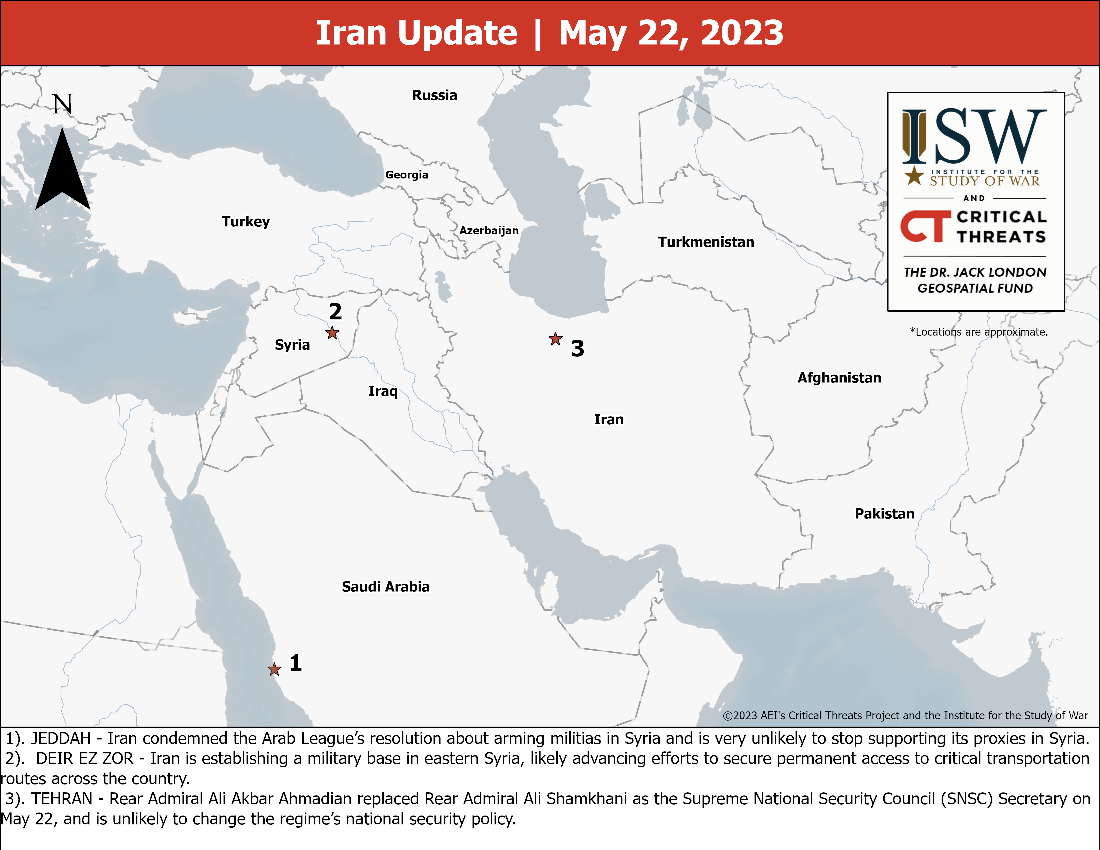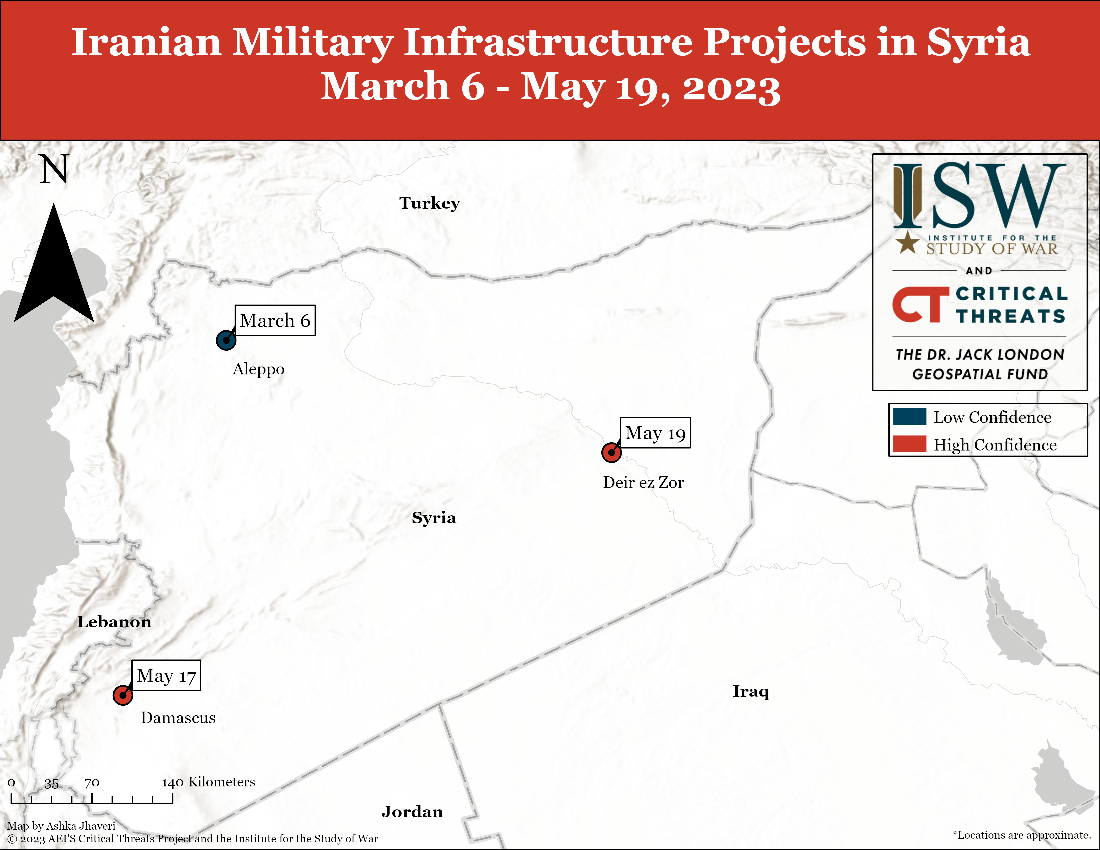 |
 |
Iran Update, May 22, 2023
Iran Update, May 22, 2023
Amin Soltani, Ashka Jhaveri, Andie Parry, and Kitaneh Fitzpatrick
The Iran Update aims to inform national security policy by providing timely, relevant, and independent open-source analysis of developments pertaining to Iran and its Axis of Resistance. This update covers political, military, and economic events and trends that affect the stability and decision-making of the Iranian regime. It also provides insights into Iranian and Iranian-sponsored activities abroad that undermine regional stability and threaten US forces and interests. The Critical Threats Project (CTP) at the American Enterprise Institute with support from the Institute for the Study of War (ISW) provides these updates Monday through Friday. To receive Iran Updates via email, please subscribe here.
Key Takeaways
1. Iran condemned the Arab League’s resolution about arming militias in Syria and is very unlikely to stop supporting its proxies in Syria.
2. Iran is establishing a military base in eastern Syria, likely advancing efforts to secure permanent access to critical transportation routes across the country.
3. Rear Admiral Ali Akbar Ahmadian replaced Rear Admiral Ali Shamkhani as the Supreme National Security Council (SNSC) Secretary on May 22, and is unlikely to change the regime’s national security policy.
Iranian Activities in the Levant
This section covers Iranian efforts to consolidate and expand Tehran’s economic, military, and political influence throughout the Levant and especially in Syria. This section examines some of the many campaigns that Iran is pursuing to achieve this strategic objective. CTP will update and refine our assessments of these campaigns over time and in future updates.
Iran condemned the Arab League’s resolution about arming militias in Syria and is very unlikely to stop supporting its proxies in Syria. Syrian state media released the final communique of the Arab League Summit in Jeddah on May 19, which highlighted Arab state unity and uncharacteristically rejected external support for non-state militias.[1] Iranian Foreign Affairs Ministry Spokesperson Nasser Kanani expressed dissatisfaction with the resolution.[2] Bashar al Assad met with Saudi and Emirati leaders in Jeddah to strengthen economic and bilateral ties, demonstrating Assad’s increased opportunities for economic engagement with neighboring countries.[3] Saudi Arabia and the United Arab Emirates have not indicated willingness or capacity to collaborate militarily with Syria, leaving Iran as one of Assad’s key security partners. Saudi Arabia normalized relations with Iran on March 10 and the United Arab Emirates is funding key infrastructure projects in Iran, demonstrating Arab League states’ mixed policy toward Iran.[4]
Iran is establishing a military base in eastern Syria, likely advancing efforts to secure permanent access to critical transportation routes across the country. The Lebanon-based construction company Jihad al Binaa began building a permanent Iranian military base including a barracks, weapons storage facility, training camp, and dozens of houses for families of Iranian-affiliated militants in Deir ez Zor City on May 19.[5] Jihad al Binaa is a US-sanctioned company that Iran funds and Lebanese Hezbollah operates.[6] A senior Iranian military and religious delegation toured several military sites in Deir ez Zor Province, including the new military base in Deir ez Zor City on May 20.[7] Senior Iranian officials have previously arrived to Deir ez Zor Province to assess operational security ahead of expanding operations in Syria.[8] Iranian militants established two other military bases in Syria that reinforce a long-term Iranian effort to secure multiple ground and air routes into Syria. Popular Mobilization Forces constructed 500 prefabricated residential units near Aleppo city following the February 6 earthquake and may have used them to establish long-term housing for their troops, as CTP previously reported.[9] Iranian-backed militants began constructing a permanent military base in southern Damascus on May 17.[10] Iranian bases in Aleppo, Damascus, and Deir ez Zor ensure Iran’s ability to transfer weapons to its proxy network in the Levant. Ongoing Iranian infrastructure projects indicate that the Arab League resolution condemning arming militias is very unlikely to deter Iranian activity in Syria.
Iranian Domestic Affairs
This section covers factors and trends affecting regime decision-making and stability. CTP will cover domestic politics, significant protest activity, and related issues here.
Rear Admiral Ali Akbar Ahmadian replaced Rear Admiral Ali Shamkhani as the Supreme National Security Council (SNSC) Secretary on May 22, and is unlikely to change the regime’s national security policy.[11] The SNSC is composed of senior regime officials and is charged with deliberating on Iran’s defense and national security policies. Ahmadian is an extended member of the IRGC Command Network, a group of commanders and associates who wield significant influence over regime decision-making.[12] The Command Network is comprised of hardline individuals who are likely to maintain the status quo and who have historically opposed reformist policies. Ahmadian was one of the 24 IRGC commanders who sent a threatening letter to former reformist President Mohammad Khatami in July 1999, warning him that the IRGC would act if he did not rein in reformist currents.[13] Ahmadian is also a member of the Expediency Discernment Council, a governmental body that arbitrates legislative disputes and advises the Supreme Leader.[14] Ahmadian began his IRGC service during the Iran-Iraq War, became IRGC Navy Commander in 1989, IRGC Joint Staff Chief in 2000, and IRGC Strategic Studies Center Head in 2007.[15]
Shamkhani’s departure is significant given his ten-year tenure as SNSC Secretary, but not surprising given months-long reports of his departure. Reports in November 2022 suggested that Shamkhani resigned after hardline officials advocated for his dismissal because of his handling of the Mahsa Amini protest movement.[16] CTP is considering the hypothesis that Ahmadian’s appointment may have been a partial effort to appease hardline factions who were allegedly dissatisfied with Shamkhani's response to recent unrest. Hardline factions, including the IRGC Command Network, may assess that Ahmadian will be more willing to support future crackdowns on anti-regime demonstrations.
[1] https://sana [dot] sy/?p=1897417
[2] https://mfa [dot] ir/portal/NewsView/719821
[3] https://sana [dot] sy/?p=1897008 ; https://sana [dot] sy/?p=1897396
[4] https://iranpress [dot] com/content/77413/uae-interested-developing-relations-with-iran-using-the-north-south-corridor ; https://www.wsj.com/articles/saudi-arabia-iran-restore-relations-in-deal-brokered-by-china-406393a1
[5] https://eyeofeuphrates (dot) com/ar/news/2023/05/20/8570; https://www.syriahr.com/%d8%a8%d9%87%d8%af%d9%81-%d8%aa%d8%ad%d9%88%d9%8a%d9%84%d9%87%d8%a7-%d9%84%d9%85%d9%82%d8%b1%d8%a7%d8%aa-%d8%b9%d8%b3%d9%83%d8%b1%d9%8a%d8%a9-%d8%a7%d9%84%d9%80-%d9%80%d9%85%d9%80-%d9%80%d9%8a%d9%80/608811/
[6] https://sanctionssearch.ofac.treas.gov/Details.aspx?id=10053
[7] https://eyeofeuphrates (dot) com/ar/news/2023/05/21/8578
[8] https://www.understandingwar.org/backgrounder/iran-update-march-22-2023
[9] https://www.criticalthreats.org/analysis/iran-update-march-8-2023
[10] https://www.criticalthreats.org/analysis/iran-update-may-17-2023
[11] https://www.farsnews dot ir/news/14020301000993
[12] https://www.criticalthreats.org/wp-content/uploads/2016/07/pdf_uploadanalysisThe_IRGC_Command_Network-1.pdf
[13] https://www.criticalthreats.org/wp-content/uploads/2016/07/pdf_uploadanalysisThe_IRGC_Command_Network-1.pdf
[14] https://nournews dot ir/Fa/News/140248
[15] https://www.irna dot ir/news/85118490 ; https://nournews dot ir/Fa/News/140248
[16] https://www.criticalthreats.org/analysis/iran-crisis-update-november-18

